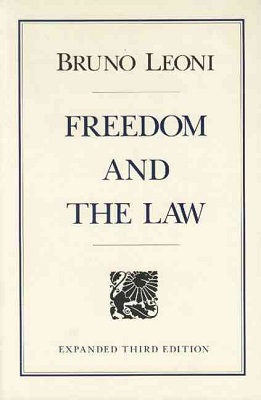Law, Legislation, and Leoni
By Arnold Kling

It is a question of deciding whether individual freedom is compatible in principle with the present system centered on and almost completely identified with legislation. This may seem like a radical view. I do not deny that it is. But radical views are sometimes more fruitful than syncretistic that serve to conceal the problems more than they solved them.1
Legal scholar Bruno Leoni offered his radical critique of the institution of the legislature in a series of lectures in 1958, published in 1961 as Freedom and the Law. His thesis was that cumulative legal precedent, or common law, is adequate for providing citizens with the rule of law. In Leoni’s view, enactment of laws by legislators is unnecessary and in fact harmful. His criticisms of the legislative process would apply even more strongly in today’s environment, in which much of the legislative power of writing rules has been assigned to regulatory agencies.
Leoni argued that law can emerge on a case-by-case basis. Each time a court makes a decision, its task is to find the outcome that most fits social norms. This, Leoni argued, is a discovery process.
Both the Romans and the English shared the idea that the law is something to be discovered more than to be enacted and that nobody is so powerful in his society as to be in a position to identify his own will with the law of the land. (Leoni, page 11)
Leoni questioned the value of supplementing common law with legislation.
Substituting legislation for the spontaneous application of nonlegislated rules of behavior is indefensible unless it is proved that the latter are uncertain or insufficient or that they generate some evil that legislation could avoid while maintaining the advantages of the previous system. (page 14)
As a polity grows larger, the idea of legislators representing the population as a whole becomes less and less tenable. Leoni wrote,
… the more numerous the people are whom one tries to “represent” through the legislative process and the more numerous the matters in which one tries to represent them, the less the word “representation” has a meaning referable to the actual will of the people (page 19)
Leoni claimed that the socialist calculation problem applies to legislation. That is, just as a central planner lacks the information that emerges in a market, a legislator lacks the information that emerges in case law.
… no legislator would be able to establish by himself, without some kind of continuous collaboration on the part of all the people concerned, the rules governing the actual behavior of everybody in the endless relationship that each has with everybody else. No public opinion polls, no referenda, no consultations would really put the legislators in a position to determine these rules, any more than a similar procedure could put the directors of a planned economy in a position to discover the total demand and supply of all commodities and services. (emphasis added; page 20)
In short,
… a legal system centered on legislation resembles in its turn—as we have already noticed—a centralized economy in which all the relevant decisions are made by a handful of directors, whose knowledge of the whole situation is fatally limited and whose respect, if any, for the people’s wishes is subject to that limitation. (emphasis added; page 22)
Our intuition tells us that legislation, by putting rules in writing, provides citizens with certainty. In theory, legislation gives us precise boundaries of what is legal and what is not. Against this, Leoni argued that in practice, legislation creates uncertainty, because laws can be changed suddenly and without warning. A business that is planned under one set of rules may become unprofitable under new legislation.
The certainty of the law, in the sense of a written formula, refers to a state of affairs inevitably conditioned by the possibility that present law may be replaced at any moment by a subsequent law. The more intense and accelerated is the process of law-making, the more uncertain will it be that present legislation will last for any length of time. Moreover, there is nothing to prevent a law, certain in the above-mentioned sense, from being unpredictably changed by another law no less “certain” than the previous one. (page 80)
Of course, in the United States today, with regulatory agencies carrying out the legislative function, the process of law-making has only become more intense and accelerated than it was in Leoni’s day. Ask the executives of mortgage finance firms or health insurance firms whether they operate in an environment of certainty today.
Still, I am skeptical that the legal system could operate effectively today without legislation and agency regulation. Society today is highly complex in terms of the types of interactions and the number of people involved in interactions.
The legal setting differs from the market setting in that the legal setting is an arena of conflict. If I need someone to fix my car, I enter the market arena. The mechanic and I agree on a price, and ordinarily both of us walk away happy: my car is fixed, and the mechanic has been paid. The transaction involves mutual satisfaction.
But suppose that my car is still not working properly when I go to the mechanic to pick it up. The mechanic claims to deserve to be paid, and I claim otherwise. Now we are in the arena of conflict. The legal system is there to provide a peaceful, fair way to resolve this conflict.
In the Middle Ages, the possible permutations of interpersonal interactions were few. The myriad of goods and services that we see today did not exist. Specialization was not advanced, and a much larger share of production took place within the household. In this relatively simpler environment, the number of potential conflicts was small and the application of precedents could be clear.
For more on these topics, see “The Regulator’s Calculation Problem,” by Arnold Kling, Library of Economics and Liberty, April 6, 2015. See also Regulation, by Robert Litan in the Concise Encyclopedia of Economics.
For background on Friedrich Hayek’sLaw, Legislation, and Liberty, see the EconTalk podcast episodes Boudreaux on Law and Legislation and Boudreaux on Reading Hayek.
For background on Ronald Coase and the Coase Theorem, see the EconTalk podcast episode Munger on Subsidies and Externalities.
Today, because of the vast increase in specialization and trade, there are many more potential sources of conflict. Resolving each of these through court cases and interpretation of precedents might be very time-consuming, expensive, and frustrating. It could be that without formal laws and regulatory rules we would be spending an inordinate amount of resources engaged in litigation. As large a share of the economy that legal expenses take up today, it might be far larger if we relied solely on law to emerge case by case.
Another challenge is that many of our interactions today involve more than just two parties. For example, a design flaw in an automobile will affect tens of thousands of buyers, not just one. This creates a Coasean bargaining problem involving the affected consumers, for which the class-action lawsuit is not a very satisfying solution. To the extent that regulations of automobile design can prevent these situations from arising, regulation can lower the transaction costs in the economy.
Of course, even if the intent of legislators and regulatory agencies is to reduce the social and economic frictions of litigation, the outcome can turn out to be quite different. Whether Leoni was correct that we would be better off relying solely on emergent case law is an empirical question.
*Arnold Kling has a Ph.D. in economics from the Massachusetts Institute of Technology. He is the author of several books, including Crisis of Abundance: Rethinking How We Pay for Health Care; Invisible Wealth: The Hidden Story of How Markets Work; Unchecked and Unbalanced: How the Discrepancy Between Knowledge and Power Caused the Financial Crisis and Threatens Democracy; and Specialization and Trade: A Re-introduction to Economics. He contributed to EconLog from January 2003 through August 2012.
For more articles by Arnold Kling, see the Archive.

